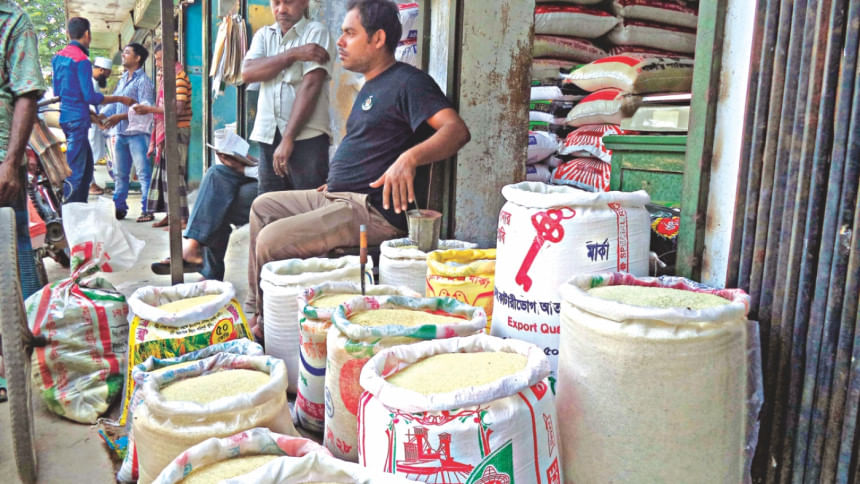Rice price goes up

Prices of rice have edged up amid the government's ongoing purchase, falling supply from farmers and flood in the country's northern region, said millers and traders.
In Dhaka, retail prices of coarse rice rose by 6.45 percent to Tk 32-34 per kg from Tk 30-32 a month ago, according to the Department of Agricultural Marketing.
Prices of the staple also soared in Rangpur and Dinajpur due to supply shortages as millers prefer delivering to government warehouses at Tk 32 a kg, reports our Dinajpur correspondent.
Fine rice, including miniket and paizam, has also become dearer. A 50 kg bag of fine rice was selling between Tk 2,400 and 2,600 at a rice wholesale market in Mahiganj of Rangpur town on Sunday, up from between Tk 2,000 and Tk 2,200 two to three weeks ago, said traders.
According to some buyers and traders, prices of coarse rice have increased by nearly Tk 6 per kg in some areas of Rangpur and Dinajpur over the last two to three weeks. On Sunday, the commodity was trading at up to Tk 33 each kg, up from Tk 26 two to three weeks ago.
“How come prices go up so fast? Is there any rule?” questioned an annoyed Ibrahim Ali in Bahadurbazaar of Dinajpur town.
He claimed of buying a kg of BR-11 rice for Tk 33 this week, which he could get for Tk 26 two weeks ago at the rice markets in Bahadurbazaar. He blamed syndication of traders for the price hike.
Visiting the markets in the area on Sunday, The Daily Star found that coarse and medium-grain rice was traded at between Tk 1,600 and Tk 1,800 per 50 kgs. Some traders said the same quantity of rice was sold between Tk 1,300 and 1,500 two to three weeks ago.
“The current price is quite high for me,” said Masud Rana, a rickshaw puller in Rangpur. He urged the government to look into the matter.
Early this month, the Directorate General of Food started procuring rice as per contracts with millers. The food office aims to buy five lakh tonnes of parboiled rice and 50,000 tonnes of sundried rice from the boro crop, harvesting of which ended in June.
The office earlier bought 6.69 lakh tonnes of paddy at Tk 23 per kg during the boro season.
As of August 16, the food office bought 44,763 tonnes of rice, according to food ministry data. The government procures rice to create a stock and to give price support to growers.
KM Layek Ali, general secretary of Bangladesh Auto, Major and Husking Mills Association, said rice prices increased owing to rising prices of paddy. The government's procurement of paddy was the main reason behind the price spiral, he pointed out.
Prices of almost all varieties of paddy rose by up to Tk 300 each maund (40 kilograms) since the end of the boro season, he said, adding that the market saw poor supply of coarse paddy since the beginning of public procurement.
He said marginal farmers do not have paddy in their hand now. “Big-scale farmers and traders who hold back their stock now have paddy,” he added.
Some traders said big-scale farmers and stockists have slowed down the supply of paddy assuming that import of rice would be very expensive due to duty hike by the government.
“Many millers are also buying from local markets to deliver rice to public warehouses,” said Layek.
The government imposed 25 percent duty on rice import in the current fiscal year to protect interest of farmers.
Sheikh Abul Kashem, secretary of Rangpur Rice Millers Association, said big merchants were holding their stock. He hoped supply would improve by the end of this month.
Abdur Rashid, owner of Matin Rice at Mohammdapur Krishi Market in Dhaka, said prices of the staple have been on the rise since the Eid-ul-Fitr early last month. He attributed the price hike to higher paddy prices.
Prices of fine and medium quality rice increased by Tk 4-6 per kg since May this year owing to spike in paddy prices, said Nirod Boron Saha, a wholesaler and commission agent in Naogaon, one of the main rice trading hubs in the country's north.
Saha, also president of Dhan O Chal Aratdar O Byabosayee Samity in Naogaon, blamed the price spiral on slow supply of paddy from big farmers and traders.
He said higher prices of coarse rice might affect low-income and working class people.
“But the price hike is not abnormal. Increase in prices appears to be tolerable from the view point of increased wages of day labourers,” he added.

 For all latest news, follow The Daily Star's Google News channel.
For all latest news, follow The Daily Star's Google News channel. 



Comments